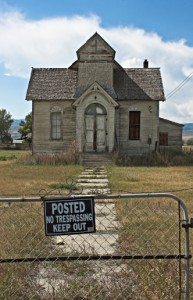
Jesus answered him, “I have spoken openly to the world; I always taught in synagogues and in the temple, where all the Jews come together; and I spoke nothing in secret (John 18:20).
Want to lead like Jesus?
Stop hiding your agenda. [click to continue…]
 CNN had an interesting story yesterday. The headline: “When Christians Become a Hated Minority.” Like so many other current cultural debates, it assumes that Christ followers are camped out on one issue. Maybe that’s because that issue is the one place, seemingly, where the world has managed to join forces with the tide of popular opinion. Now anybody who speaks out against homosexual behavior or gay marriage is a hate-filled bigot.
CNN had an interesting story yesterday. The headline: “When Christians Become a Hated Minority.” Like so many other current cultural debates, it assumes that Christ followers are camped out on one issue. Maybe that’s because that issue is the one place, seemingly, where the world has managed to join forces with the tide of popular opinion. Now anybody who speaks out against homosexual behavior or gay marriage is a hate-filled bigot.
The article fairly raises the question of whether Christian-haters are the new bigots. It points out that many believers avoid saying anything about, well, anything for fear of the backlash.
This raises a painful question for Christians: Why are we being trampled on? It sure seems that anywhere you turn anybody and everybody has the right to say whatever they want, do whatever pleases them, and demand to be accepted. But let somebody mention Jesus or the word “Christian” and the arrows fly from all sides.
Here’s the problem: We’re asking the wrong people. [click to continue…]
 A few years ago I was having coffee with an old friend and colleague. I was in a pretty wounded state at the time, and felt compelled to tell him my story. He was compassionate, listened attentively, then asked, “How can I help?”
A few years ago I was having coffee with an old friend and colleague. I was in a pretty wounded state at the time, and felt compelled to tell him my story. He was compassionate, listened attentively, then asked, “How can I help?”
“I was thinking about visiting your church,” I said, “and just wanted you to know.”
“Well, I’ll be honest with you,” he replied. “We’re not much of a healing place.”
Wow. There it was. Translation: We’re more interested in fresh blood than spilled blood. But to be fair, his church was and is true to its mission as they perceive it. And at least he was kind enough to be honest.
For years I have heard the old saying, “The Christian army is the only army in the world that shoots its wounded.” Let me say right up front, that’s not accurate. If you really believe that, you’ve never been in a corporate “army” or a political one. The wounded get eliminated there all the time.
But the church is supposed to be different, right? We’re supposed to be trophies of grace, havens of love, lighthouses of hope and (make your own cliché here: [blank] of [blank]). So what’s up with that right foot of fellowship? [click to continue…]
 Nehemiah discovered a gap between what was and what should be.
Nehemiah discovered a gap between what was and what should be.
What was – local thugs were keeping the holy city of his fathers in ruins as the people there had tried to rebuild it for 40 years.
What should be – a city with a wall around it.
In that discovery, he made a risky decision. It wasn’t enough to pray or weep over it. He needed to take action. So Nehemiah aimed for The Gap. And 52 days after his arrival in Jerusalem, the wall was completed.
Moses was hiding from his past on the back side of the desert when he discovered a gap between what was and what should be.
What was – the cries of the oppressed Israelites had reached the ears of their God.
What should be – a nation of slaves set free to inherit the land of God’s promise.
In that discovery, he made a risky decision. It wasn’t enough to stand there and try to argue with a burning bush and the God who was calling him. He needed to take action. So Moses aimed for The Gap. And weeks later, he and a few million of his family members stood at the edge of the Red Sea.
This is the essence of leadership. [click to continue…]
 Imagine you are going into an office that has two points of entry. Either door leads into the same large area. It’s during office hours, so you know both doors are unlocked. The first door you come to is closed. The second, a little further down the hall, is open. Which door do you go in?
Imagine you are going into an office that has two points of entry. Either door leads into the same large area. It’s during office hours, so you know both doors are unlocked. The first door you come to is closed. The second, a little further down the hall, is open. Which door do you go in?
I actually had that conversation with someone who challenged me. We were going down the hallway and I passed the first door – the closed one, and walked in through the open door.
“Why did you do that?” Krista asked.
“Do what?”
“You walked past a perfectly good door to go through the second.”
“Because the second one was open,” I said, a little baffled that someone would actually question that.
“But the first one was closer,” Krista said. Krista was a high school senior, our next door neighbor, and wonderful babysitter. She was also literally a genius. We had lots of deep conversations like this back in the day.
Then I blurted out this little gem of wisdom that revealed a lot more than I planned: [click to continue…]
 Strike up the band celebrity endorsements, hang those chads, and God bless the United States of America! It’s that time again! Voters in many parts of the country are already heading to the polls to vote early for the upcoming election, and the turn-off (um, I mean turnout) is high!
Strike up the band celebrity endorsements, hang those chads, and God bless the United States of America! It’s that time again! Voters in many parts of the country are already heading to the polls to vote early for the upcoming election, and the turn-off (um, I mean turnout) is high!
What better way to remind you that these are humans, not just 8 x 10 glossies, than with another round of Hanukkah Hams?
Since it’s been a while, let me give you the talking points on what a Hanukkah Ham is. Named in honor of somebody who suggested that his Greenwich Village Jewish customers would love a big ham for their next Hanukkah celebration, a Hanukkah Ham is a really bad (translation: stupid) idea concocted by usually really smart people.
Previous Hanukkah Ham stories have explored the worlds of electricity, money, college life, Christmas, air travel and hunting, to name a few.
But with so many words flying these days, what could invite more people to ask, “Did he just say that?” than political races across the country? Ever since I heard Philip Johns promise to get grits au gratin taken off the lunchroom menu in seventh grade, and Richard Tyson promised to build a student center in ninth, I’ve heard people running for office – any office – say some pretty outlandish things. I guess it just comes with the territory. [click to continue…]
 The inhabitants of a small third-world village were understandably alarmed. An earthquake was literally shaking every corner of their world, and they were terrified.
The inhabitants of a small third-world village were understandably alarmed. An earthquake was literally shaking every corner of their world, and they were terrified.
All except for one elderly woman, that is, who remained completely calm throughout the whole ordeal. When things had settled down, one of the villagers asked her, “Weren’t you afraid during that earthquake?”
“No,” she replied, “I wasn’t. You see, I just rejoiced to know that I have a God who is powerful enough to shake the world.”
Needless to say, she had a “peace that passes all understanding.” I wonder if I do. I wonder if you do.
I was speaking on this at a retreat over the weekend and I recognized something really important about the peace that is every Christian’s birthright:
Peace isn’t the punch line of a beauty contest joke or the passive purview of those who breathe deeply and chant. Peace isn’t for sissies. It’s the result of a conquest. It is an expression of the God of Heaven going to war to protect our thoughts and minds.
Read these two well-known verses again and look for the traces of battle: [click to continue…]

Be the fly on the wall for this conversation…
It’s not that life here is so bad right now.
Okay.
It’s that life is so busy. Urgent all the time.
I can relate to that.
And not even that it’s urgent, but that I don’t feel as though I am responding well to the urgency I do have.
What do you mean?
Nothing ever gets completely done. Or so it feels. My weekly schedule is pretty busy as it is. Then factor in anything else that has been added to the schedule lately, and I’m having a hard time breathing.
I think I know what the problem is.
You do?
Yep. Your Urgency Response Index is low.
My what?
Your Urgency Response Index.
Sounds serious.
It can be. [click to continue…]
by Andy Wood on May 2, 2012
in Consumers, Five LV Laws, Gamblers, Hoarders, LV Alter-egos, Pleasers, Principle of Abundance, Principle of Eternity, Principle of Freedom, Principle of Increase, Principle of Legacy
 I have an urgent news flash for you: Just because you know something is wrong, that doesn’t mean you’ll avoid it.
I have an urgent news flash for you: Just because you know something is wrong, that doesn’t mean you’ll avoid it.
Shocking, I know. And the corollary is also true: Just because you know you’re supposed to do something, that doesn’t mean you’ll do it.
Suppose you could interview Jonah – the Old Testament’s version of Gilligan – and ask him what the most important requirement was for prophets. What do you think he’d say? My guess is that he would tell you that a prophet’s number one job is to speak what he hears the Lord saying to speak.
Why, then, did Jonah have to travel from the boat to the belly to the burp to the beach before he decided to do what his own standard said to do?
Resurrect a first-century Pharisee and ask him what it took to please God, and you’d probably hear something about keeping the law and prophets, serving God and walking in humility and discipline.
Why, then, did Jesus refer to the scribes and Pharisees as unwilling to lift a finger to meet a need, doing all their deeds to be noticed by men, loving the place of honor at banquets and the chief seats in the synagogues, and insisting on being called by respectful titles in public? If serving God faithfully was so important to them, why did the Son of God warn people not to be like them?
Whenever the bad news breaks out about somebody who has shocked us with their oh-no, no-no behavior, we often ask silly questions like, “Well didn’t they know that was wrong?” Of course they did. Why, then, would someone violate their own standards of right and wrong? [click to continue…]
 There’s a well-known philosophy in some leadership circles that leaders never admit their mistakes. This being an election year, you can expect to see that in full force.
There’s a well-known philosophy in some leadership circles that leaders never admit their mistakes. This being an election year, you can expect to see that in full force.
The problem with that philosophy is that being in a position of leadership – formally or informally – puts you out in front of people where they can see your mistakes loud ’n’ clear. So when you pretend you don’t have any, you look worse than proud. You look rather stupid.
The biggest issue with mistakes in leadership is not whether you make them, but whether you repeat them. Show me a politician, a corporate executive, a pastor, or any other form of “leader” who dodges the issue of failures, I’ll show you a leader destined to repeat the same mistakes.
On the other hand, if it’s true that being a leader means being “first learner,” then one of the best places to start is with your own lessons learned the hard way. Here are 10 lessons I learned by getting it wrong before I ever got it right: [click to continue…]









